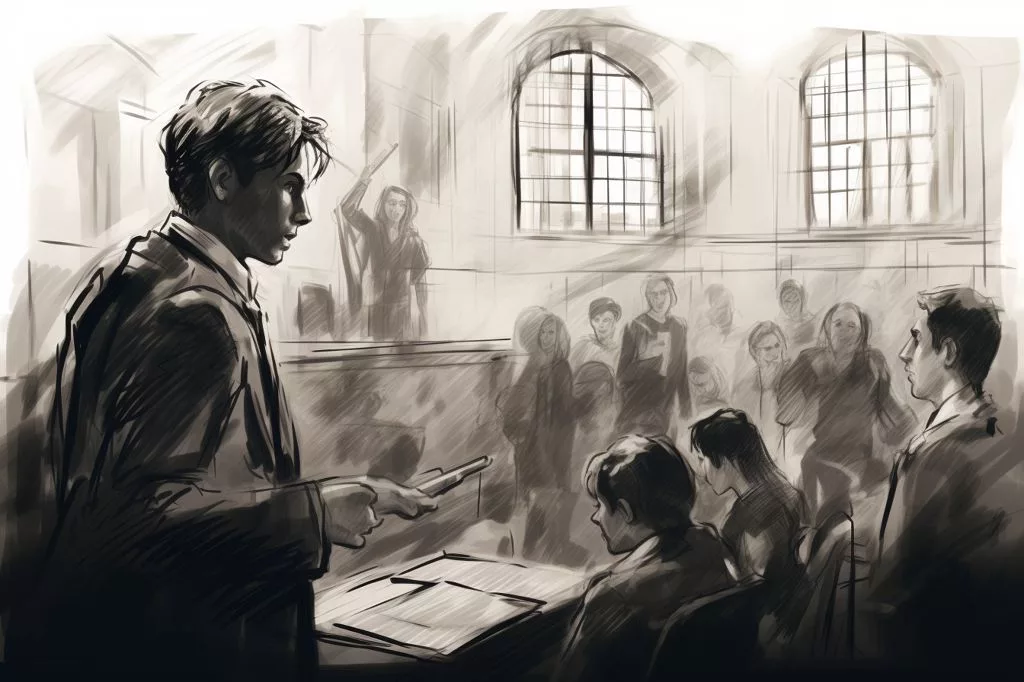South Africa’s Departments of Basic Education, Justice and Constitutional Development, and the South African Human Rights Commission have organized the 12th National Schools Moot Court Programme (NSMCP), aimed at educating high school students about the country’s constitution and legal system. The NSMCP is divided into four stages, beginning with essay workshops and culminating in a grand finale at the Constitutional Court in Johannesburg. The programme promotes civic responsibility and dedication to social justice among young minds, fostering a diverse talent pool of future legal professionals committed to upholding the constitution and safeguarding human rights.
Nurturing Young Legal Minds: Event Overview
South Africa’s Departments of Basic Education (DBE), Justice and Constitutional Development (DOJ&CD), and the South African Human Rights Commission (SAHRC) have come together to organize the 12th National Schools Moot Court Programme (NSMCP). This esteemed event, scheduled for the 5th to 8th of October 2023, aims to impart a profound understanding of the country’s constitution and legal system to high school learners.
The University of Pretoria will host the initial rounds on the 5th and 6th of October, culminating in the grand finale at the Constitutional Court in Braamfontein, Johannesburg, on the 8th of October. Participants can look forward to a thrilling experience as they present their arguments before distinguished Constitutional Court judges.
This year’s hypothetical problem statement deals with Flames Mine, a major employer in the Mpumalanga Province’s Einfontein community. The mine offers bursaries and internships to employees’ children, enabling them to pursue various qualifications within the mining sector. Participants will be challenged to employ their critical thinking, analytical, and debating abilities to address intricate legal and societal matters.
The Four-Stage Programme: From Essay Workshops to the Grand Finale
The NSMCP is divided into four phases, commencing with essay workshops designed to equip students with the skills necessary for effective and coherent expression of their thoughts. These workshops are facilitated through collaborations with universities, South African Legal Aid, the DOJ&CD, and the SAHRC.
Upon completing the workshops, learners will undertake essay writing to showcase their grasp of the relevant legal matters. Based on their essays, the top two teams will be chosen to compete in the grand finale at the Constitutional Court in Johannesburg. These finalists will have the rare opportunity to present their oral arguments in front of a panel of South African Constitutional Court judges.
Deputy Minister of Justice and Constitutional Development, Mr. John Jeffery, will address the audience during the grand finale. This event marks a significant achievement for the students, as they demonstrate their intellectual abilities, eloquence, and commitment to the rule of law amidst the nation’s leading legal minds.
The media is invited to attend the oral rounds at the University of Pretoria Law Faculty on the 5th and 6th of October, as well as the grand final at Constitution Hill, Braamfontein, Johannesburg, on the 8th of October.
Building the Future: Benefits and Impact of the NSMCP
The National Schools Moot Court Programme is a valuable initiative that seeks to nurture future legal professionals and uphold South Africa’s constitutional principles. By engaging with the nation’s legal framework, it promotes civic responsibility and dedication to social justice among young minds.
The DBE, DOJ&CD, and SAHRC’s collaborative efforts provide students with a platform to sharpen their analytical and debating skills in a competitive yet nurturing environment. Through participation in this esteemed event, learners gain critical insights into the legal profession and the intricate workings of the South African judiciary.
Furthermore, the programme stimulates interest in legal studies among high school students, fostering a diverse talent pool of future professionals committed to upholding the constitution and safeguarding human rights. The NSMCP’s significance transcends the courtroom, as it ultimately shapes the minds and values of the nation’s future leaders.
This year’s NSMCP promises an enlightening and inspiring showcase of South Africa’s most promising young legal minds. As they assemble in the University of Pretoria and the Constitutional Court, participants will undoubtedly give their utmost effort, driven by their passion for justice and guided by the expertise of eminent legal professionals.
In conclusion, the 12th National Schools Moot Court Programme epitomizes the power of partnership and mentorship in nurturing the potential of South Africa’s youth. As learners confront complex legal issues and present their arguments to esteemed judges, they will undoubtedly develop as individuals and future leaders. The nation keenly anticipates the results of this exciting event and the lasting impact it will have on the lives of its participants.
What is the National Schools Moot Court Programme (NSMCP)?
The NSMCP is an initiative organized by South Africa’s Departments of Basic Education, Justice and Constitutional Development, and the South African Human Rights Commission. It aims to educate high school students about the country’s constitution and legal system, and promote civic responsibility and dedication to social justice among young minds.
What are the four stages of NSMCP?
The NSMCP is divided into four stages, starting with essay writing workshops designed to polish students’ skills in effective and coherent expression of their thoughts. The top two teams are selected based on their essays to compete in the grand finale at the Constitutional Court in Johannesburg, where they present their oral arguments before a panel of distinguished Constitutional Court judges.
What is the hypothetical problem statement for NSMCP 2023?
The hypothetical problem statement for NSMCP 2023 deals with Flames Mine, a major employer in the Mpumalanga Province’s Einfontein community. The mine offers bursaries and internships to employees’ children, enabling them to pursue various qualifications within the mining sector.
Who can participate in NSMCP?
High school students in South Africa can participate in NSMCP.
When and where will the NSMCP 2023 take place?
The NSMCP 2023 will take place from the 5th to 8th of October, with the initial rounds at the University of Pretoria and the grand finale at the Constitutional Court in Braamfontein, Johannesburg.
What are the benefits of participating in NSMCP?
Participation in NSMCP provides high school students with a platform to sharpen their analytical and debating skills in a competitive yet nurturing environment. It also stimulates interest in legal studies among students, fostering a diverse talent pool of future professionals committed to upholding the constitution and safeguarding human rights.
Who are the organizers of NSMCP?
The NSMCP is organized by South Africa’s Departments of Basic Education, Justice and Constitutional Development, and the South African Human Rights Commission.
What is the impact of NSMCP on South Africa’s youth?
The NSMCP nurtures future legal professionals and upholds South Africa’s constitutional principles. By promoting civic responsibility and dedication to social justice among young minds, it shapes the minds and values of the nation’s future leaders. The programme ultimately fosters a diverse talent pool of future professionals committed to upholding the constitution and safeguarding human rights.








